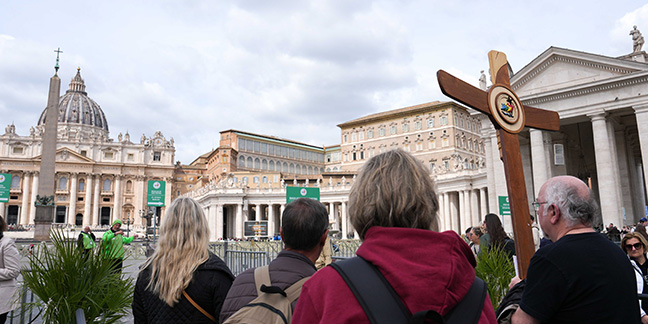 VATICAN CITY — Jesus loves people as they are, not based on their merit or righteousness, said the text for Pope Francis' weekly general audience.
VATICAN CITY — Jesus loves people as they are, not based on their merit or righteousness, said the text for Pope Francis' weekly general audience.
"Precisely because Jesus looks within each one of us, he loves us as we truly are," said the text prepared for April 9.
"What does Jesus see when he looks within every one of us and loves us, despite our distractions and our sins? He sees our fragility, but also our desire to be loved as we are," he wrote.
While Pope Francis was not holding audiences since he was still recovering from double pneumonia and multiple infections, the Vatican has been publishing the texts prepared for his general audiences each Wednesday.
During the Holy Year 2025, the pope's audiences have focused on "Jesus Christ our hope." Continuing a series looking at Gospel stories of Jesus' encounters with different people and how meeting him changed their lives, the April 9 text focused on St. Mark's presentation of Jesus' encounter with "the rich man."
The Gospel account (Mk 10:17-31) tells the story of an unnamed rich man who asks Jesus what he must do to "inherit eternal life" after insisting he has observed all the commandments since his youth.
Pope Francis, in his text, asked people to notice that the man uses the verb "inherit," indicating that "eternal life is for him an inheritance, something that is obtained by right, through meticulous observance of commitments."
However, "since observance of the law did not give him the happiness and security of being saved, he turns to the master Jesus," the pope wrote.
The man realizes something is missing and is still searching for the meaning of his life, the text said. "Indeed, beyond the things we do, our sacrifices and successes, what truly counts in order to be happy is what we carry in our heart."
"What is striking is that this man does not know the vocabulary of gratuitousness," the pope wrote. "Everything seems to be owed. Everything is a duty. … But in a life lived in this way, although certainly for good purpose, what space can love have?"
Jesus, however, looks at the man and loves him even before he invites the man to follow him, the pope wrote. "He loves him just as he is. Jesus' love is gratuitous: exactly the opposite of the logic of merit that has beset this person."
"We are truly happy when we realize we are loved in this way, freely, by grace," he wrote. "And this also applies to the relationships between us: as long as we try to buy love or beg for affection, those relationships will never make us feel happy."
Jesus then invites him to sell everything he has, give to the poor and "change his way of living and relating with God," he wrote. "Jesus recognizes that inside him, as in all of us," the thing that is lacking is "the desire we carry in our heart to be loved."
To fill this void, "we do not need to 'buy' recognition, affection, consideration: instead, we need to 'sell off' everything that weighs us down, to make our hearts freer. There is no need to continue to take for ourselves but rather to give to the poor, to provide, to share," the pope's text said.
Jesus also invites this man no longer be alone and sad, but to follow him, create a bond and experience a relationship, he wrote. "Perhaps today, precisely because we live in a culture of self-sufficiency and individualism, we find ourselves more unhappy because we no longer hear our name spoken by someone who loves us freely."
Sometimes, the pope wrote, "what we think are riches are instead only burdens that are holding us back. The hope is that this person, like each one of us, will sooner or later change and decide to set sail" with Jesus as the guide and companion.
The pope asked people to pray for "all people who are sad and undecided, so that they may feel the loving gaze of the Lord, who is moved by looking tenderly within us."
— Carol Glatz, Catholic News Service


